

The Health Foundation. Young people’s mental health is another area of concern, with the latest data from 2017 showing that 11.2% of 5–15-year olds report having at least one mental health disorder, up from 9.7% in 1999.
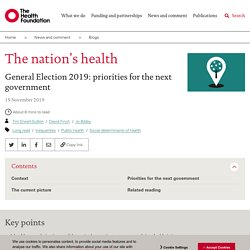
This rise has been driven by increased rates of emotional disorders, particularly anxiety and depression. Emotional disorders are particularly common in teenagers, with 14.9% of 11–16-year olds affected. Finally, drug misuse deaths and alcohol-specific deaths are now higher than at the turn of the century, with both rates over 30% higher than in 2001. In parallel, over the last five years there has been an 11% fall in the number of people receiving treatment for drug and alcohol misuse. The success rate of treatment has also been falling: it is now five percentage points lower than it was in 2013/14. Changes in living and working conditions There are also concerns about the impact of insecurity on health, particularly for young people, in areas from work to housing.
To RCT or to not RCT. On the issue of “evidence” and public health. – Sheffield DPH. This is a blog on “public health” and evidence.
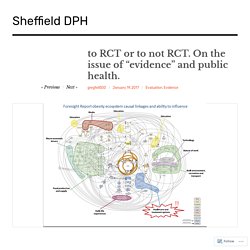
It’s a bit murky….and is a thorny issueThe blog is in 2 sections – interpreting evidence and generating evidence Context….complexity is difficult to reduce in evidential terms Imagine the complexity of something like “obesity” and sorting “the evidence” for this…..across multiple domains Quoting Rutter (2013) “The intellectual key to understanding obesity is to pursue that shift of paradigm, in the true sense of the phrase (Kuhn 1996), from conceptualising it as a complicated system, with many parts that interact in predictable linear ways, to understanding it as a complex one, with all that entails. “Tackling obesity demands an approach that does not merely coordinate the discrete actions of a huge number of individuals, organisations, and sectors.
Richard Smith: Strong evidence of bias against research from low income countries – The BMJ. I have taught classes on how to get published in scientific journals in many low and middle income countries, and just about every participant in every class has thought that science journals are biased against research from low and middle income countries.
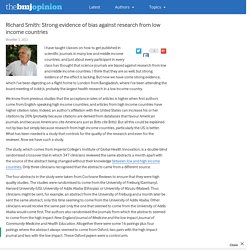
I think that they are as well, but strong evidence of the effect is lacking. But now we have some strong evidence, which I’ve been digesting on a flight home to London from Bangladesh, where I’ve been attending the board meeting of icddr,b, probably the largest health research in a low income country. We know from previous studies that the acceptance rates of articles is higher when first authors come from English-speaking high income countries; and articles from high income countries have higher citation rates. The four abstracts in the study were taken from Cochrane Reviews to ensure that they were high quality studies. A total of 551 responded to the first abstract, and 347 (63%) responded to both abstracts. Introduction to Health Economics. Policy triangle. 00493925. 00493856. A framework for producing scientific advice on health.
Free online learning resource: Evidence-informed decision-making in public health. Tool: Contextualizing guidance workbook to help you apply recommendations from one context to another. Research: what sort of evidence is valued by policy makers? MPs value the views of constituents and expert opinion more highly than evidence from randomised controlled trials, a new survey has found.
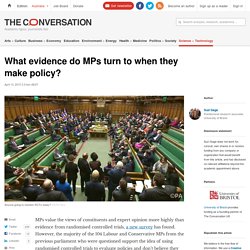
However, the majority of the 104 Labour and Conservative MPs from the previous parliament who were questioned support the idea of using randomised controlled trials to evaluate policies and don’t believe they are too expensive. The survey, conducted by Ipsos MORI and the charitable trust Sense about Science, also found that MPs were more inclined to act on their own principles than on the results of randomised controlled trials, which involve testing new interventions on a randomly selected group of people and comparing that with a control group of people who get the usual intervention. Interestingly, the survey found that the views of experts and the opinions of constituents trumped those of practitioners, such as teachers or doctors. It also found that MPs give very little weight to the views of journalists. Each word in the name RCT is important.
Video: the art and craft of policy briefs. Opinion: the ethics and effectiveness of nudging. Since the publication of 2008’s Nudge by Richard Thaler and Cass Sunstein, policy ‘nudges’ have been in fashion, with smaller interventions aimed at altering public behaviour in a subtle manner being adopted by many governments, including in the UK.
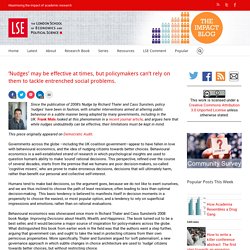
Frank Mols looked at this phenomenon in a recent journal article, and argues here that while nudges undoubtedly can be effective, their limitations must be kept in mind. This piece originally appeared on Democratic Audit. Governments across the globe –including the UK coalition government—appear to have fallen in love with behavioural economics, and the idea of nudging citizens towards better choices. Behavioural economics is a well-established strand of research in which psychological insights are used to question human’s ability to make ‘sound’ rational decisions.
Behavioural economics was showcased once more in Richard Thaler and Cass Sunstein’s 2008 book Nudge: Improving Decisions about Health, Wealth, and Happiness.